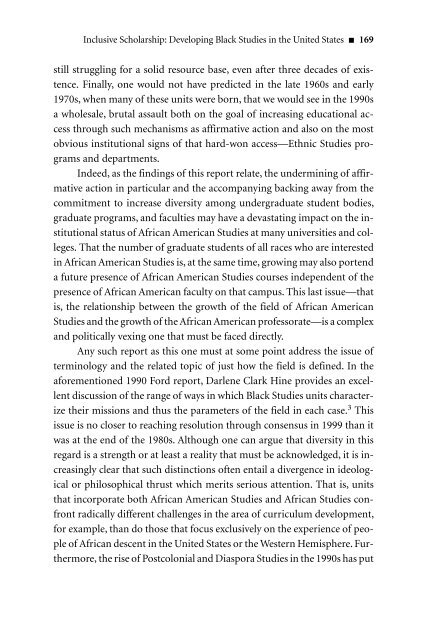Inclusive Scholarship: Developing Black Studies - Ford Foundation
Inclusive Scholarship: Developing Black Studies - Ford Foundation
Inclusive Scholarship: Developing Black Studies - Ford Foundation
You also want an ePaper? Increase the reach of your titles
YUMPU automatically turns print PDFs into web optimized ePapers that Google loves.
<strong>Inclusive</strong> <strong>Scholarship</strong>: <strong>Developing</strong> <strong>Black</strong> <strong>Studies</strong> in the United States 169<br />
still struggling for a solid resource base, even after three decades of existence.<br />
Finally, one would not have predicted in the late 1960s and early<br />
1970s, when many of these units were born, that we would see in the 1990s<br />
a wholesale, brutal assault both on the goal of increasing educational access<br />
through such mechanisms as affirmative action and also on the most<br />
obvious institutional signs of that hard-won access—Ethnic <strong>Studies</strong> programs<br />
and departments.<br />
Indeed, as the findings of this report relate, the undermining of affirmative<br />
action in particular and the accompanying backing away from the<br />
commitment to increase diversity among undergraduate student bodies,<br />
graduate programs, and faculties may have a devastating impact on the institutional<br />
status of African American <strong>Studies</strong> at many universities and colleges.<br />
That the number of graduate students of all races who are interested<br />
in African American <strong>Studies</strong> is, at the same time, growing may also portend<br />
a future presence of African American <strong>Studies</strong> courses independent of the<br />
presence of African American faculty on that campus. This last issue—that<br />
is, the relationship between the growth of the field of African American<br />
<strong>Studies</strong> and the growth of the African American professorate—is a complex<br />
and politically vexing one that must be faced directly.<br />
Any such report as this one must at some point address the issue of<br />
terminology and the related topic of just how the field is defined. In the<br />
aforementioned 1990 <strong>Ford</strong> report, Darlene Clark Hine provides an excellent<br />
discussion of the range of ways in which <strong>Black</strong> <strong>Studies</strong> units characterize<br />
their missions and thus the parameters of the field in each case. 3 This<br />
issue is no closer to reaching resolution through consensus in 1999 than it<br />
was at the end of the 1980s. Although one can argue that diversity in this<br />
regard is a strength or at least a reality that must be acknowledged, it is increasingly<br />
clear that such distinctions often entail a divergence in ideological<br />
or philosophical thrust which merits serious attention. That is, units<br />
that incorporate both African American <strong>Studies</strong> and African <strong>Studies</strong> confront<br />
radically different challenges in the area of curriculum development,<br />
for example, than do those that focus exclusively on the experience of people<br />
of African descent in the United States or the Western Hemisphere. Furthermore,<br />
the rise of Postcolonial and Diaspora <strong>Studies</strong> in the 1990s has put

















